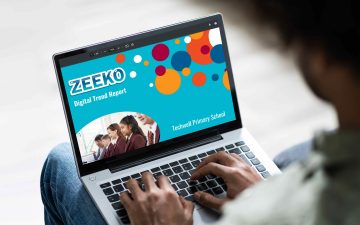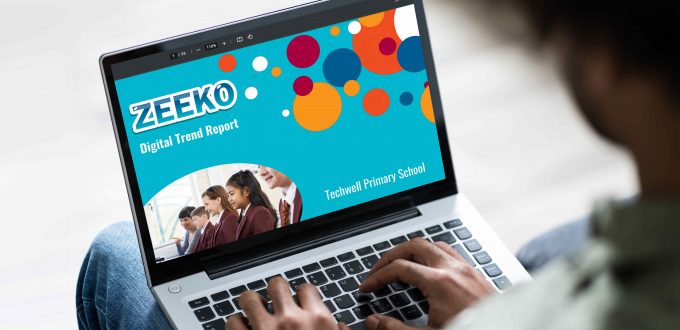Zeeko publishes the results of its latest digital trend report Children’s Online Behaviour in Ireland 2016-18
Dublin, 24th April. Zeeko, headquartered at NovaUCD, announced the findings of its digital trend report Children’s Online Behaviour in Ireland 2016-18. The data used in this survey was collected from May 2016 to February 2018 in primary and secondary schools throughout Ireland. In this report Zeeko provides a comprehensive analysis of children’s online behaviour over a 16 month time frame, namely an entire school year (2016/2017) and one semester (2017/18). Zeeko has surveyed 244 schools (173 primary, 71 secondary), and a total of 35,867 children (18,131 males and 17,736 females). This is the one of the most extensive studies on children’s digital behaviour in Ireland to date.
What do children know and feel when spending time online? How does their online behaviour change over the years, e.g. in the transition from primary to secondary schools? How does the offline world impact their online behaviour? The research results show to what extent Irish children face online risks, depending also on gender differences and what kind of school they attend.
Children are using different digital devices to go online, mostly smartphones and handheld devices that ensure greater levels of privacy. Zeeko has identified and looked into the following categories of online risks: screentime, cyberbullying, stranger danger, and exposure to explicit content, all with gender-specific outcomes. The research shows that:
- Younger children have access to the Internet earlier when compared to their older peers; they start accessing the internet between 6 and 7 years of age.
- In the transition between primary and secondary school, there is a progressive increase in the use of smartphones and a decrease in the use of tablets. This coincides with the critical age when children start to value their privacy.
- Almost 70% of primary school children reported to know more than their parents about apps and online gaming. 52% of boys and 44% of girls in 6th class declared to know more about social media and the internet in general.
- YouTube, Snapchat, and Minecraft are the favourite apps of primary school children; while secondary school students rated Snapchat, Instagram and YouTube as their favourite apps (only 21% use Facebook).
- Primary school children spend between 1 to 2 hours per day online during weekdays. During the weekend there is an increase in the number of hours spent online; 23% of 6th class children declared spending more than 5 hours online.
- The perception of the different types of online risks was higher in the sample of females, both in primary and secondary schools.
- Child victims of cyberbullying ranged from the 10% in 1st class to the 18% in 6th year. Children that witnessed cyberbullying ranged from 20% in primary schools to 45% in 6th year. Starting from 5th class, the percentage of female victims of cyberbullying increased progressively reaching 31% in 6th year.
- The number of children talking to strangers online increased progressively throughout primary and secondary school years, reaching 62% in 6th year.
- 24% of children in 1st class and 53% in 6th class played an 18+ game. Throughout primary school, boys played online games 4 times more than their female peers (48% vs. 12%).
- Teenagers (6th year) showed the highest percentages of sexting behaviour, specifically: 30% sent sexually suggestive images, 22% shared sexts, 28% sexted a non-partner, 16% sexted someone they met online for the first time. Male adolescents presented higher percentages in all sexting behaviours.
The research also considered the behavioural trends of children attending different kinds of schools, namely DEIS, Catholic and Multidenominational. “Delivering Equality of Opportunity in Schools” (DEIS) is a governmental plan for schools located in communities at risk of disadvantage and social exclusion.
Online behaviour of children attending DEIS schools:
- Experiences of witnessing and being a victim of cyberbullying is slightly higher in both primary and secondary DEIS schools when compared to the rest of the sample, especially for what concerned witnessing cyberbullying. DEIS secondary schools: 38% vs. 33% witnessed cyberbullying; while 15% vs. 13% were victims.
- The percentage of boys playing 18+ games is higher in DEIS primary school (34% vs. 31%).
- Children in DEIS primary schools are slightly more concerned about the protection of their personal data online. However, this trend changes in secondary school: 49% and 36% considered privacy as a very serious issue. For children attending other schools values are respectively 47% (primary) and 40 % (secondary).
Dr Everri commented:“When children enter secondary school they might feel more confident in managing their personal information online; for this reason they recalibrate the perception of this risk as very serious”.
- Children in DEIS primary schools are slightly more concerned about the protection of their personal data online. However, this trend changes in secondary school: 49% and 36% considered privacy as a very serious issue. For children attending other schools values are respectively 47% (primary) and 40 % (secondary).
- Children in DEIS secondary schools reported higher percentages of contacts with strangers online especially in secondary school (DEIS 48%; NON-DEIS: 40%). Males in DEIS secondary schools showed higher percentages reaching 55% (37% females). Dr Everri interpreted the results as follows: “The increase in contacts with strangers online is in line with the need for expanding their social network; teenagers in DEIS schools seem to explore the online world more than their peers. It is confirmed that this behaviour is more frequent among male adolescents”.
- In DEIS secondary schools percentages of sexting behaviours are higher; 15% sexted a non-partner and shared sext versus, respectively 11% and 10% in the samples of children attending other schools.
Online behaviour of children attending Catholic and Multidenominational schools:
- Differences can be observed in the perception of risk and in the experiences children had online. As for protection of personal data online, children attending Catholic primary schools presented higher percentages 48% vs. 39%.
- Percentages of boys playing 18+ games in Catholic schools are slightly higher than children attending secular schools.
Dr Everri commented: “It might be that parents in Catholic schools control gaming less than other activities or they might have less knowledge, as parents in general, about games’ age limits”.
- Percentages of boys playing 18+ games in Catholic schools are slightly higher than children attending secular schools.
- The analyses on cyberbullying and sexting assessed in secondary schools showed that they were more frequent in multidenominational schools (children being victims of cyberbullying: 26% vs. 13%; sending sext messages: 31% vs. 14%).
Dr Everri commented: “Having greater access to the internet implies encountering more risks. It is likely that adolescents in Catholic schools face more restrictions, thus encounter online risks less. However, the restrictions do not allow them to experiment with the internet and eventually develop more skills, resilience for example. Future research should explore if and what resources adolescents rely on to protect themselves from online risks”.
- The analyses on cyberbullying and sexting assessed in secondary schools showed that they were more frequent in multidenominational schools (children being victims of cyberbullying: 26% vs. 13%; sending sext messages: 31% vs. 14%).
Dr Marina Everri, a social psychologist, is Head of Research at Zeeko and a visiting fellow at the Department of Media and Communications, London School of Economics. Together with Dr Kirsty Park, psychologist, researcher at DCU and lecturer at DIT and UCD, Dr Everri analysed the data Zeeko has collected to the date.
Dr Everri said: “These results provide new insights into children’s online behaviour in Ireland relying on a large sample of children and teenagers throughout the country. However, more research is needed to understand the trends we have outlined, especially for what concerned the samples of children attending DEIS schools or schools having different ethos. For instance, children in DEIS schools seem to be somewhat more vulnerable to risky experiences online; this can be due to a lack of resources in their economic and socio-cultural environment. Children in Catholic schools seem to be less exposed to online risks (e.g. sexting and cyberbullying). However, this can be due to the fact that they receive more restrictions and regulations about access to the internet differently from their peers in multidenominational schools who experiment and explore the online world more. For this reason, we need more data on children’s social and economic background as well as on their families’ values, functioning and dynamics to provide better interpretations of the observed trends”.
The complete Zeeko “Children’s Online Behaviour in Ireland 2016-18” digital trend report is available here.
ENDS 24th April, 2018
For further information contact:
Dr Marina Everri, Head of Research at Zeeko, NovaUCD, t: +44 (0)7856 707986, e: marina@zeeko.ie or
Iva Bubalo, Communications at Zeeko, NovaUCD, t: +353 (83) 0424 247, e: iva@zeeko.ie
Editors Notes
Zeeko, an EC H2020 Funded High Potential Start-Up, is headquartered at NovaUCD, the Centre for New Ventures and Entrepreneurs at University College Dublin. The company was founded by Joe Kenny in 2013. Zeeko works with parents, teachers and children to promote digital health and internet safety among primary and secondary school children. www.zeeko.ie
At NovaUCD, the hub for new ventures and entrepreneurs at University College Dublin, we nurture and support new high-tech and knowledge-intensive companies as part of UCD’s mission. At NovaUCD we provide purpose-built, state-of-the-art incubation facilities alongside a comprehensive business support programme for client companies such as Zeeko. NovaUCD has been funded through a unique public-private partnership that includes AIB Bank, Arthur Cox, Deloitte, Enterprise Ireland, Ericsson, Goodbody Stockbrokers, UCD and Xilinx. www.ucd.ie/novaucd


